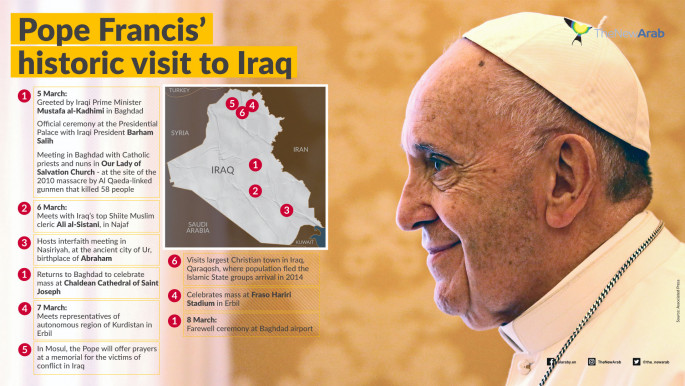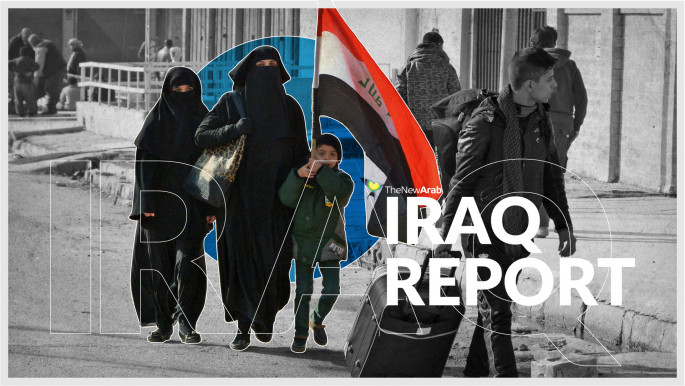The Iraq Report: Will Pope Francis' visit help fix country's problems, or just paper-over them?
Editor's note: This article is part of our special coverage of Pope Francis' visit to Iraq. The rest of our coverage can be accessed on this regularly updated portal.
While many have welcomed the papal visit – the first of its kind in modern history – many other Iraqis have been dismayed by controversial measures taken to ensure his security by both armed non-state actors close to Iran and official Iraqi security services.
In a country where powerful Iran-backed militias remain an almost supreme power and abuses against human rights continue to go unchecked as protesters are killed and tortured for expressing an opinion, Pope Francis has a unique and historical opportunity to apply pressure on the Iraqi establishment by shining a light on these inequities.
Whether he favours speaking candidly to assuage the pain of normal Iraqis or chooses a more diplomatic track to avoid offending officials and clerics acting as his hosts remains to be seen, although in his speech today he called for an end to 'violence and extremism' in the country.
Iraqi Christians in crisis
The historic papal visit due to conclude on Sunday has been welcomed most by the Iraqi Christian community, who have suffered under both the rule of the Islamic State (IS) in recent years as well as years of neglect by post-invasion, Shia Muslim dominated governments that have failed to provide them with security.
Prior to the US-led invasion that toppled the former Baathist dictatorship of Saddam Hussein, Iraq’s Christian community was one of the largest in the mostly Muslim Middle East, with a population numbering approximately 1.5 million inhabiting the capital Baghdad, areas in Nineveh governorate, and smaller communities in Iraqi Kurdistan.
Saddam’s regime was influenced by Syrian Baathist ideologue Michel Aflak, who was himself a Christian. Saddam’s vice president, foreign minister, and close aide, Tariq Aziz, was also a member of the Chaldean community, the largest of Iraq’s Christian denominations.
|
||
However, the prosperity enjoyed by the Christian community under the former regime was turned on its head following the invasion and the rise of powerful Shia Islamist politicians and militias, as well as Sunni jihadist groups like Al-Qaeda and latterly IS.
Although the majority of reporting in the West was focused on Sunni extremists, the reality is that Iraqi Christians were repeatedly targeted by both Sunni and Shia militants.
Since IS’ defeat in 2017, Iraqi Christian communities have been displaced in a campaign of ethno-sectarian cleansing orchestrated by Shia militants fighting under the banner of the Popular Mobilisation Forces (PMF), an official branch of the Iraqi military that is closely supported and overseen by Iran.
For example, Bartella was once 95 percent Christian. After IS took control of the town, it imposed a tax on the Christian community, forcing them to either pay it or be expelled. If they did not pay or leave, they were threatened with death.
Despite IS' defeat at the hands of the US-led anti-IS coalition and Iraqi security forces, nothing has changed for the Christians of Bartella.
Rather than allowing them to move back into their ancestral homes, the PMF have instead rewarded Shabak fighters with lands, homes, and shops that formerly belonged to the expelled Christians. The town is now majority Shabak.
“It is like the old feudal days,” a resident of Bartella who asked not to be named for reasons of security, told The New Arab. “These fighters fought for their masters and have now been rewarded with lands that aren’t even theirs to distribute.”
The Shabak are an ethno-religious community who live in the Nineveh plains and follow Shia Islam, some of whom claim to be ethnically Kurdish. Many Shabak fought in the PMF.
The America Magazine, a Catholic Jesuit outlet, interviewed one of Iraq’s most senior Christian figures Petros Mouche, the Archbishop of Mosul, in February 2020. He took aim at negative Iranian influence for being a major reason behind the lack of a resurgence in the Iraqi Christian population, which now stand at 250,000, a fraction of its pre-invasion numbers.
“The tensions between Iran and the US haven’t changed anything for now, but that doesn’t mean the situation is good,” Mouche was quoted as saying in the aftermath of the Trump administration’s assassination of Iran’s Islamic Revolutionary Guard Corps commander Qassem Soleimani.
“As long as the presence and influence of Iran remains in Iraq and especially in the Nineveh Plains, there is a risk of more problems and difficulties in co-existing peacefully with our neighbours,” the archbishop said.
The lack of peaceful coexistence is not solely a problem that arises from Muslim groups, however.
Citing the need to defend Christians from IS, Christian extremists formed their own militias and fought alongside the PMF. These same Christian militias openly broadcast videos threatening to perpetrate a sectarian cleansing campaign against other communities in Nineveh.
With Pope Francis due to visit Grand Ayatollah Ali Sistani in the Shia shrine city of Najaf, this could be an opportunity for the pontiff to raise the plight of the Christian community who have been denied their ancestral properties by Shia militias while defusing Christian extremism.
Sistani holds great sway amongst the Shia community and it was his fatwa, or religious edict, that created the PMF in the first place. His role in establishing the military unit that has now taken control over Christian towns has some blaming him for not doing enough to rein in the militants.
“The Shia obeyed him when he told them to fight Daesh,” the local resident said, using the Arabic acronym for IS. “They would surely obey him if he issued a clear fatwa ordering them out of our lands. The fact that he doesn’t tells us Christians a lot about his so-called ‘peaceful’ credentials.”
Political and social upheaval mars papal visit
But it is not only the Christian community that will be affected by Pope Francis’ visit, with many ordinary Iraqis being subjected to massively enhanced security protocols to ensure the papal visit goes smoothly.
Iraqis who have been protesting against the abuses and corruption of the federal authorities in Baghdad have expressed anger and annoyance at the visit as they claim it allows their oppressors an opportunity to polish their image.
Despite the Iran-sponsored attacks against US-led coalition forces positioned at the western Ain al-Assad Airbase earlier this week, Pope Francis was undeterred and said his trip would go ahead.
This has led Iraqi authorities to rush to beautify cities the Pope intends to visit, including painting and repaving dilapidated streets in Baghdad, Najaf, Mosul, Qaraqosh, and even the ancient city of Ur, the cradle of Abrahamic faiths.
Iraqis took to social media with the Arabic hashtag “Ask the Pope” to take aim at their government.
“I ask the Pope to travel by car along the main highway north. Maybe they'll pave that too,” said Hussein Habib.
One Twitter user asked the 84-year-old pontiff to carry out a surprise visit somewhere in Iraq to get a better sense of what services were really like for citizens.
Many Iraqis even in the capital Baghdad live on streets that are not paved and flood in the winter, while most households only have a few hours of state-provided electricity per day.
“[The government] repaired streets for the Pope. They even added new paintwork. But they couldn’t do the same for regular Iraqis? It took a high-profile visit for them to care,” Sarah Ahmed Tahir, who lives in Baghdad, told The New Arab.
The lacking public services prompted mass rallies in Iraq in 2019, but they died down following protest-related violence that left around 600 people dead and was condemned by the Pope himself at the time.
They have since flared up again with violence in Nasiriyah, not far from the Pope's stop in Ur in the south, leading to civilian deaths.
Making matters worse for Iraqis are the significant restrictions they face on freedom of movement throughout their own towns and cities.
To ensure the Pope’s security, Iraqi authorities have imposed heavy security restrictions, locked down entire cities, and deployed large numbers of military forces that have ground traffic to a painstaking crawl.
Meanwhile, a little-known Shia militia called the Guardians of Blood Brigade that claimed the deadly Erbil International Airport attack last month, and is widely believed to be a façade for the more powerful Kataeb Hezbollah militia, announced a unilateral ceasefire for the duration of the pontiff’s visit.
“We will suspend every form of military operation during the visit of the Pope, out of respect for Imam [Ayatollah Sistani] and in the name of Arabian hospitality,” the militia said.
But Iraqi analysts critical of the authorities and Iranian influence in the country were unimpressed by the measures and the militias' self-declared ceasefires.
“Firstly, the Iranian-backed militias and the authorities are closely intertwined,” Ahmad Al-Mahmoud, a member of the Iraqi opposition based in London told The New Arab.
“Iran wants this visit. It wants the Pope to meet a curated list of officials. It also does not mind if he meets with Sistani, even though they are supposed to oppose each other, because it makes their Iraqi client state look good,” Al-Mahmoud continued.
“Without these high-profile visits and carefully crafted messaging, the world will continue to see Iraq and the post-2003 order for what it is – a failure.”
Iraq is certainly facing a crisis of confidence. The security situation continues to spiral, an already dire economy has slowed to a crawl in light of the global coronavirus pandemic, and Iraq has only managed to source 50,000 doses of a cheap but moderately effective Chinese vaccine in a country with a population of 38 million.
While Pope Francis does not carry much in the way of raw political power on the international stage, his soft power due to his profile is undeniable and he is perhaps uniquely placed to apply real pressure to call out the ills plaguing Iraq while extending a message of peace, a message Iraqis of all ethno-religious backgrounds hope he will succeed in delivering.
The Iraq report is a regular feature at The New Arab
Click below to see the full archive
 |
|





 Follow the Middle East's top stories in English at The New Arab on Google News
Follow the Middle East's top stories in English at The New Arab on Google News


